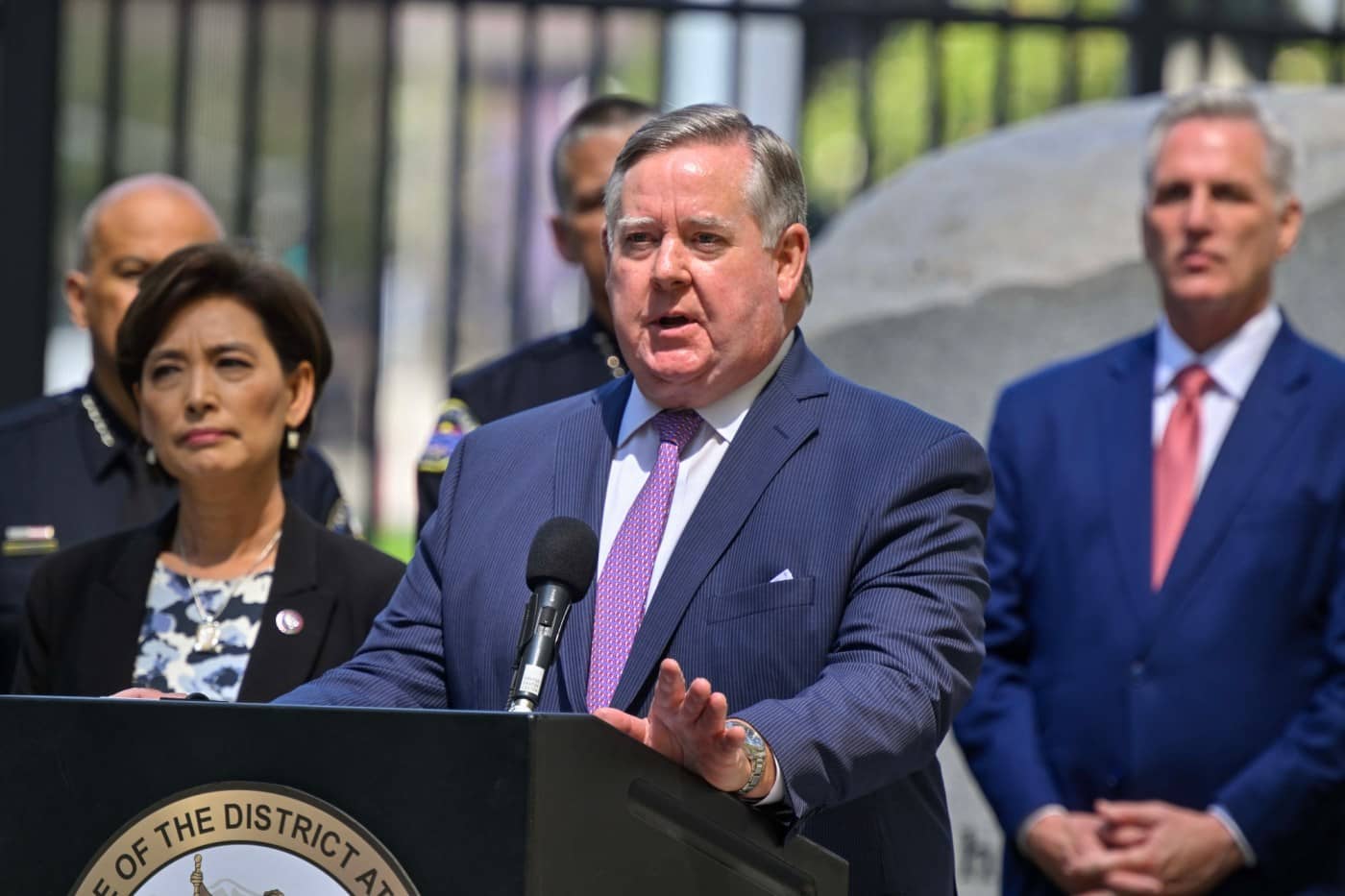A pro-Democrat political action committee has filed an ethics complaint against Rep. Ken Calvert, R-Corona, alleging the Inland Empire’s longest serving congressmember failed to disclose real estate investments near areas that benefit from federal funds he steered.
End Citizens United filed the complaint Tuesday, Aug. 6, with the nonpartisan Office of Congressional Ethics. In it, the group alleged Calvert, who represents part of Riverside County and is facing a tough reelection fight in a swing district, broke federal law by omitting information about his real estate holdings on financial disclosure reports.
“Representative Calvert is back to his old ways, shamelessly abusing his position of power for personal financial gain,” End Citizens United President Tiffany Muller said in a news release. “Through his gross misuse of earmarked funds, he’s blurring the line between his duties as an elected official and his personal business dealings.”
In an emailed statement, Calvin Moore, a Calvert campaign spokesperson, said: “This is a meritless complaint from a far-left super PAC that’s endorsed Ken’s opponent, and worse — one that gets the facts wrong.”
Moore added: “Ken has always gone above and beyond to provide transparency in his financial disclosure statements. In the rare event of a clerical error, an amended disclosure is filed.”
End Citizens United supports Democratic political candidates and seeks to reverse a 2010 U.S. Supreme Court decision that ended limits on super PAC spending in campaigns.
The complaint centers on what it describes as a conflict of interest between Calvert’s real estate portfolio and earmarks, which are federal funds directed by congressional lawmakers to projects in their districts.
Congress resumed earmarks in 2021 after banning them 10 years earlier amid scandals over their use, including $398 million spent on a notorious “bridge to nowhere” in Alaska. Former San Diego County congressmember Randy “Duke” Cunningham got an eight-year prison sentence in 2006 after prosecutors alleged he used earmarks to steer defense spending to contractors who bribed him.
Supporters of earmarks argue that they send taxpayer dollars to parts of the country that get overlooked or ignored during the normal federal budget process.
The revived earmark process comes with a number of strings attached. Money can’t be spent on projects bearing someone’s name and there’s a limit of 15 earmarks per lawmaker, for example.
Federal records show that Calvert, the most senior Republican in California’s House delegation, directed federal earmarks to areas of his 41st Congressional District not far from property he owns or co-owns, potentially boosting the properties’ value.
There’s nothing illegal about members of Congress buying real estate in their districts and Calvert has not been formally accused by officials or authorities of wrongdoing.
Earmarks Calvert steered into the federal budget include $2 million to widen the Magnolia Avenue bridge in Corona, at least $6 million to add toll lanes and reduce traffic congestion along the 15 Freeway and $5 million for rail service between Los Angeles and the Coachella Valley, congressional records show.
A review of Calvert’s 2023 financial disclosure report shows that he earns between $15,000 and $50,000 annually in rent from an automotive repair center in the 1200 block of East Sixth Street, just off the 15. He also has stakes in commercial rental properties on East Third Street, Lincoln Avenue and Grand Boulevard in Corona that are near the freeway, the report shows.
Prior to the ethics complaint being filed, Will Rollins, the Democrat challenging Calvert in the Nov. 5 election, assailed his opponent’s use of earmarks.
“It’s clear that this is a pattern of practice for Ken Calvert,” Rollins said in a news release. “Over the last 30 years, Congressman Calvert has abused his office to increase his own net worth by up to $20 million. No wonder why he’s been ranked one of the most corrupt members of Congress time and again.”
Coby Eiss, Rollins’ campaign manager, said the $20 million figure is based on information from Calvert’s financial disclosure forms filed with Congress.
Rep. Ken Calvert, R-Corona, owns this commercial property on East Sixth Street in Corona. It’s not far from a stretch of the 15 Freeway where Calvert, through the earmark process, directed federal funds that will be used to build toll lanes. Critics contend Calvert’s use of earmarks boosts the value of his real estate holdings. (Photo by Anjali Sharif-Paul, The Sun/SCNG)
Rollins added: “Voters across Riverside County are sick of career politicians who exploit their taxpayer-funded jobs to enrich themselves, while everyday folks in Corona and across the 41st District are facing rising costs, including skyrocketing rents that make it harder to make ends meet.”
Responding to Rollins in late July, Moore said Rollins “is spreading debunked lies that independent watchdogs and even The Press-Enterprise’s own editorial board have found to be totally baseless.”
“Every project that’s been funded has come at the request (of) the community and local officials,” Moore said. “Is Will Rollins suggesting he would deny community requests for infrastructure funding and refuse to fight for the millions Ken has delivered to reduce congestion if he was in Congress?”
Democratic congressional candidate Will Rollins accused his opponent, Rep. Ken Calvert, R-Corona, of abusing his office by directing earmark spending to areas near Calvert’s real estate properties. (File photo by Anjali Sharif-Paul, The Sun/SCNG)
Questions about Calvert’s use of earmarks first surfaced in the mid-2000s with several media reports zeroing in on the sale by Calvert and a real estate partner of 4.3 acres in Perris, just west of the 215 Freeway, for $985,000 — a 79% profit from the $550,000 they paid for it.
Critics said Calvert pushed for an $8 million earmark to pay for a freeway interchange that raised the value of his property, which was 16 miles away.
“It’s nowhere near anything that has anything to do with the federal government,” Calvert said at the time.
“Glory be, we made a profit … I generally buy property to improve my financial lot. I don’t make any bones about it … They still haven’t passed a law that you can’t make personal investments.”
Profits like the one Calvert made were common for landowners in the area who sold their property, economist John Husing said in 2006.
In 2007, the House ethics committee, acting at Calvert’s request, determined the congressmember did not have a financial interest in requesting federal money for a Corona transit center near some of his properties.
Calvert and Rollins are on the November ballot in the 41st district, which represents Calimesa, Canyon Lake, Indian Wells, Lake Elsinore, La Quinta, Menifee, Norco, Palm Desert, Palm Springs, Rancho Mirage, Wildomar and parts of Corona, Eastvale and Riverside.
Redistricting in 2021 created the 41st and erased Calvert’s old district, which included GOP-friendly areas of southwest Riverside County. Calvert, who cruised to reelection in years past, now represents a district with in which Republicans have a razor-thin edge in voter registration — 36.9% to 36.2%, or 3,199 voters.
Related links
This Inland congressional district could help decide control of Congress
Ken Calvert, Will Rollins could win or lose based on how they do in this area
Rep. Ken Calvert is apparent winner over Will Rollins in 41st Congressional District
What Riverside County’s GOP is doing to win in November
Do Inland Empire Democrats want Joe Biden to leave the race?
Can Riverside County Sheriff Chad Bianco become California’s governor in 2026?
Calvert beat Rollins, a former federal prosecutor, 52% to 48% in 2022.
This time around, Rollins, who like Calvert has raised millions for his campaign, is getting reinforcements from the Democratic Congressional Campaign Committee, which is targeting the 41st in its quest to end the GOP’s narrow House majority.
A Rollins campaign poll released in May showed the Democrat leading Calvert 45% to 44%. Cook Political Report, a nonpartisan political forecaster, rates the 41st as a tossup, while two other forecasters — Inside Elections and Sabato’s Crystal Ball — rate the district as “Tilt Republican” and “Leans Republican,” respectively.



